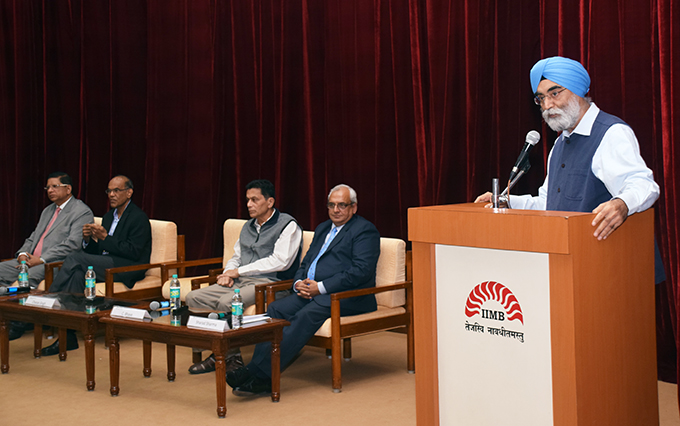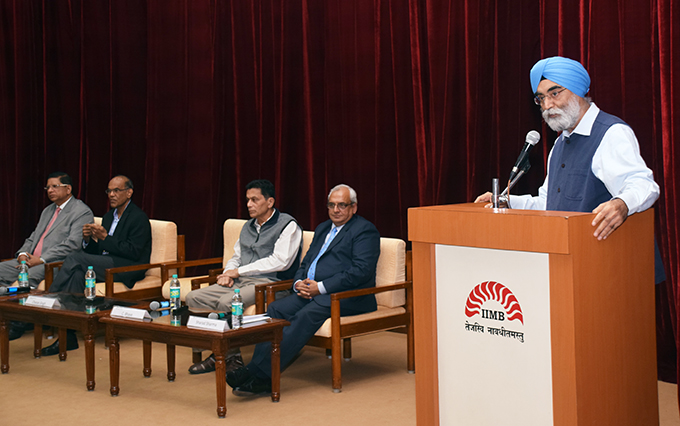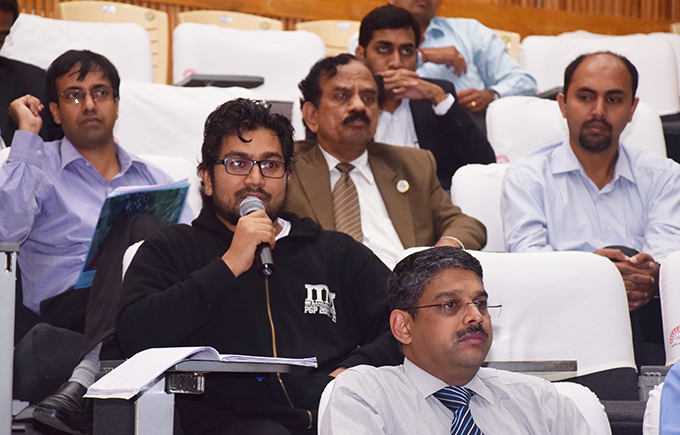‘Ethics in Financial Services must go beyond regulation’

A panel of distinguished bankers, regulators and academics concedes that the complicated nature of financial products and design of incentives could lead to unethical practices
The Centre for Corporate Governance and Citizenship (CCGC) at the Indian Institute of Management Bangalore (IIMB) hosted an elite panel to discuss 'Ethics and Financial Services' on October 20, 2014.
The panel comprised Dr. D Subbarao, former Governor, RBI; C Bhave, former Chairman, SEBI; R Dubey, former CMD, Canara Bank, Sharad Sharma, Managing Director, State Bank of Mysore and Dr. Charan Singh, RBI Chair Professor of Economics, IIMB.
Anchoring the discussion, Dr. Charan Singh said: "There is only one social responsibility of business. It is to use its resources and engage in activities designed to increase its profits, according to Milton Friedman. Today, we will try to discern why there is a general decline in ethical standards. Is there a pressure to perform with short-term and long-term invests? Is it an incentive structure or is it lax governance? Is it the absent regulatory architecture or weak enforcement?"
Emphasizing that ethics are important not only in financial services, but in all walks of life, the panelists conceded that being at the heart of prosperity, growth and development, financial services offered opportunities for deviant behavior but were quick to clarify that such behavior was not limited to the financial services sector alone.
The decline in ethical standards, they said, was also not unique to India, adding that many countries in the world faced such a crisis despite having robust laws and codes of conduct and highlighting the role of regulators in this context. "Regulators think and plan from a social angle, keeping in mind the interests of voiceless segments in society whose interests are neither represented nor lobbied," they said.
Explaining the interplay between ethics and rules, the panelists highlighted the fact that no society could survive only on the basis of rules. Legislating ethical principles will not solve the problems, they cautioned, adding that there exists a clear difference between rules and ethics. "Ethics go beyond rules and regulations," they remarked, suggesting that the only way to ensure that standards of ethical behavior were met was to follow the laws, regulations and code of conduct as laid down by the regulator.
They explained that in the face of fierce competition, providers of financial services often attempt to innovate and could, sometimes, indulge in risky and unethical behavior. But they pointed out that honesty, persistence, hard work and creativity led to long-term success, despite short-term setbacks.
Stating that ethical standards are compromised by people, irrespective of culture, age, geographical location or educational standards, they observed that it boiled down to available opportunity, remarking that human beings do fall prey to temptation. Whilst it may not be correct to assume that financial services attract, encourage and reward or incentivize unethical behavior, at times there could be pressures to be unethical and there could be opportunities to be unethical, they said. Further, the complicated nature of financial products and the design of incentives could lead to unethical behavior, focused on short term gains. The need of the hour, they said, was to think and plan for steady long-term measures to ensure high standards in every walk of life, including financial services.
The panelists said laws and code of conduct were often observed in 'letter' but not in 'spirit' because a dichotomy in ethical and legal appropriateness existed in the very fiber of modern society.
The panel observed that there was an important need, like earlier times, to lay emphasis on moral science at every stage of education. Teaching ethics only in the financial sector is not enough, they said, urging students to be guided by long-term considerations. "Ask yourselves whether society stands to gain from what you do," they advised.
Prof. Charan Singh concluded that 'Ethics and Financial Services' was not a soft subject any more, as it bore influence on financial stability, economic growth, and jobs. According to the experts, ethics in financial services should neither be treated like a 'thieves and cops' story nor an aberration of recent times.

Dr. Charan Singh, RBI Chair Professor, IIMB, welcomes panellists to the discussion on 'Ethics and Financial Services' hosted by the Centre of Corporate Governance and Citizenship (CCGC), at IIM Bangalore on October 20, 2014.

The audience had many questions for the panellists during the discussion on 'Ethics and Financial Services' hosted by the Centre of Corporate Governance and Citizenship (CCGC), at IIM Bangalore on October 20, 2014.
‘Ethics in Financial Services must go beyond regulation’
A panel of distinguished bankers, regulators and academics concedes that the complicated nature of financial products and design of incentives could lead to unethical practices
The Centre for Corporate Governance and Citizenship (CCGC) at the Indian Institute of Management Bangalore (IIMB) hosted an elite panel to discuss 'Ethics and Financial Services' on October 20, 2014.
The panel comprised Dr. D Subbarao, former Governor, RBI; C Bhave, former Chairman, SEBI; R Dubey, former CMD, Canara Bank, Sharad Sharma, Managing Director, State Bank of Mysore and Dr. Charan Singh, RBI Chair Professor of Economics, IIMB.
Anchoring the discussion, Dr. Charan Singh said: "There is only one social responsibility of business. It is to use its resources and engage in activities designed to increase its profits, according to Milton Friedman. Today, we will try to discern why there is a general decline in ethical standards. Is there a pressure to perform with short-term and long-term invests? Is it an incentive structure or is it lax governance? Is it the absent regulatory architecture or weak enforcement?"
Emphasizing that ethics are important not only in financial services, but in all walks of life, the panelists conceded that being at the heart of prosperity, growth and development, financial services offered opportunities for deviant behavior but were quick to clarify that such behavior was not limited to the financial services sector alone.
The decline in ethical standards, they said, was also not unique to India, adding that many countries in the world faced such a crisis despite having robust laws and codes of conduct and highlighting the role of regulators in this context. "Regulators think and plan from a social angle, keeping in mind the interests of voiceless segments in society whose interests are neither represented nor lobbied," they said.
Explaining the interplay between ethics and rules, the panelists highlighted the fact that no society could survive only on the basis of rules. Legislating ethical principles will not solve the problems, they cautioned, adding that there exists a clear difference between rules and ethics. "Ethics go beyond rules and regulations," they remarked, suggesting that the only way to ensure that standards of ethical behavior were met was to follow the laws, regulations and code of conduct as laid down by the regulator.
They explained that in the face of fierce competition, providers of financial services often attempt to innovate and could, sometimes, indulge in risky and unethical behavior. But they pointed out that honesty, persistence, hard work and creativity led to long-term success, despite short-term setbacks.
Stating that ethical standards are compromised by people, irrespective of culture, age, geographical location or educational standards, they observed that it boiled down to available opportunity, remarking that human beings do fall prey to temptation. Whilst it may not be correct to assume that financial services attract, encourage and reward or incentivize unethical behavior, at times there could be pressures to be unethical and there could be opportunities to be unethical, they said. Further, the complicated nature of financial products and the design of incentives could lead to unethical behavior, focused on short term gains. The need of the hour, they said, was to think and plan for steady long-term measures to ensure high standards in every walk of life, including financial services.
The panelists said laws and code of conduct were often observed in 'letter' but not in 'spirit' because a dichotomy in ethical and legal appropriateness existed in the very fiber of modern society.
The panel observed that there was an important need, like earlier times, to lay emphasis on moral science at every stage of education. Teaching ethics only in the financial sector is not enough, they said, urging students to be guided by long-term considerations. "Ask yourselves whether society stands to gain from what you do," they advised.
Prof. Charan Singh concluded that 'Ethics and Financial Services' was not a soft subject any more, as it bore influence on financial stability, economic growth, and jobs. According to the experts, ethics in financial services should neither be treated like a 'thieves and cops' story nor an aberration of recent times.

Dr. Charan Singh, RBI Chair Professor, IIMB, welcomes panellists to the discussion on 'Ethics and Financial Services' hosted by the Centre of Corporate Governance and Citizenship (CCGC), at IIM Bangalore on October 20, 2014.

The audience had many questions for the panellists during the discussion on 'Ethics and Financial Services' hosted by the Centre of Corporate Governance and Citizenship (CCGC), at IIM Bangalore on October 20, 2014.
